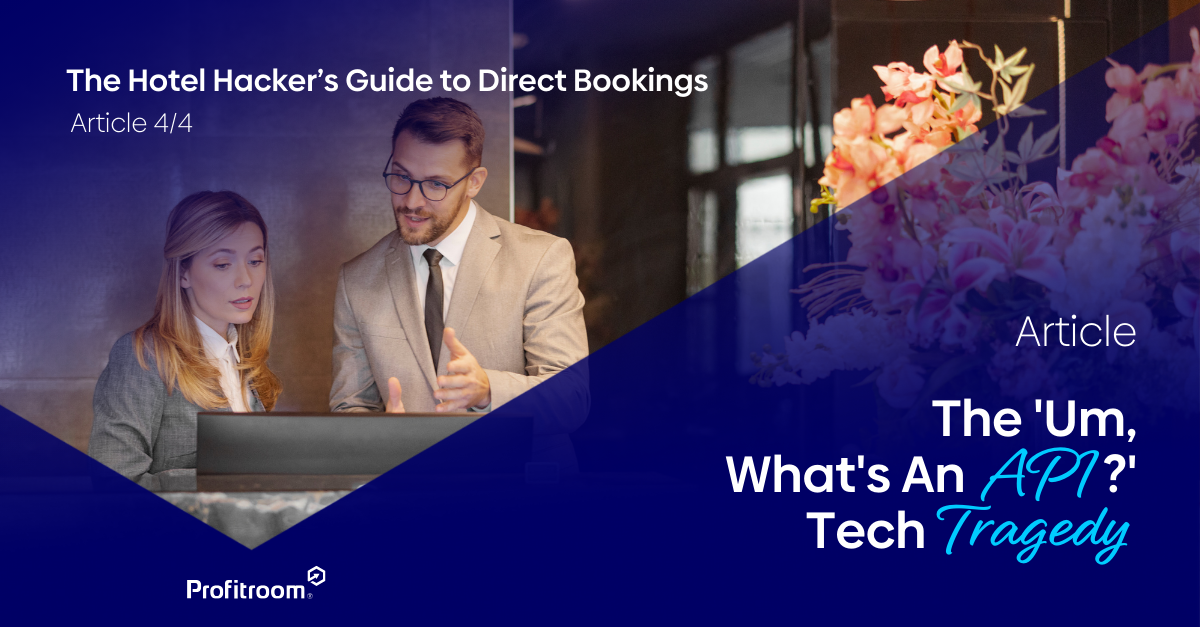The Hotel Hacker’s Guide
to Direct Bookings
Article 4/4
The 'Um, What's An API?' Tech Tragedy
Let’s be honest: most hoteliers didn’t get into this business because they love tech jargon. You’re here to create unforgettable guest experiences, not decode acronyms over coffee.
Yet there’s one little tech term that could be quietly draining your revenue, stressing out your team, and frustrating guests before they even arrive: API.
If that phrase makes you want to mutter “Um… what?”, you’re not alone—but ignoring it might already be costing you more than you think.
You've seen it before. The front desk agent's face drops as they tell a travel-weary guest there's no record of their reservation. Meanwhile, another guest is charged twice, and your revenue manager discovers that rooms sold on your website were never removed from OTA inventory.
Behind these all-too-familiar hospitality nightmares often lurks a single culprit: poor system integration. Or, as we like to call it, the "Um, What's An API?" Tech Tragedy.
When Your Hotel Tech Doesn't Talk, Nobody Walks
An API (Application Programming Interface) is a set of rules that lets different software systems talk to each other. Think of it as a translator between two people who speak different languages—or better yet, like the invisible backstage crew making sure the show runs smoothly without anyone noticing.
In hotel terms? APIs help essential systems like your PMS (Property Management System), CRM (Customer Relationship Management), Channel Manager, Booking Engine and Revenue Management System share data with ease. They also connect other key tools such as spa booking platforms, table reservations, experience scheduling apps, payment gateways—even GDS connections for distribution.
When these systems communicate seamlessly via APIs? Magic happens. But when they don’t? Well…
The Real-World Cost of Disconnected Systems
When your hotel's systems aren't properly integrated, the consequences ripple throughout your entire operation:
-
Overbookings
Imagine a room is booked on your website but that information never reaches your PMS or channel manager. The same room is subsequently sold on Booking.com. Congratulations—you now have two guests arriving for one room, and a front desk agent bracing for impact.
-
Revenue Leakage
Disconnected systems frequently lead to pricing inconsistencies, missed upsell opportunities, and inventory that sits empty despite demand. Your revenue potential quietly slips away, often without you even noticing.
-
Unhappy Guests
In today's world of seamless digital experiences, guests have little patience for hotels that can't get their tech right. When they need to repeat information they've already provided online, face unexpected charges, or encounter staff who seem clueless about their preferences, their satisfaction (and your reviews) take a hit.
-
Perpetually Empty Rooms
Without proper integration between your distribution channels and inventory management, you might be showing "no availability" on certain platforms while rooms sit empty. It's like having a store with products on the shelves but the front door locked to certain customers.
-
Staff Burnout
Perhaps the most overlooked consequence is the toll on your team. Manual data entry, reconciliation of conflicting information, and facing frustrated guests day after day leads to stressed, disengaged employees. When your staff spends more time apologising for system errors than delivering hospitality, something is fundamentally wrong.
The Ripple Effect Across Your Hotel
“Poor system integration doesn't just create isolated problems; it fundamentally undermines your ability to operate efficiently and profitably,” explains Angelene Bungay, Onboarding, Client Solutions & Delivery Director at Profitroom.
Your daily operations become a series of workarounds and manual interventions. Staff efficiency plummets as team members waste hours on data entry that should be automated.
“Guest experiences suffer when their preferences are lost between systems or when check-in takes forever because the front desk agent is fighting with the computer,” says Bungay.
Perhaps most insidious is the impact on decision-making. When your data is scattered across disconnected systems, getting accurate, comprehensive insights becomes nearly impossible. How can you make strategic decisions about pricing, marketing, or staffing when you don't have a clear picture of what's really happening in your property?
Breaking the Cycle
The good news is that these technology tragedies are entirely preventable. With properly integrated systems, your hotel can operate as the well-oiled machine it's meant to be, where information flows seamlessly, staff are empowered with the right tools, and guests enjoy the frictionless experience they expect.
The first step is admitting you have an integration problem. The second is seeking help from experts who understand both hospitality and technology.
This is where platforms like Profitroom step in: not just with powerful booking engines but with deep system integration expertise built specifically for hotels looking to scale smarter.
While the "Um, What's An API?" Tech Tragedy plays out in hotels worldwide, yours doesn't need to be among them. By prioritising system integration and working with partners who understand the complexities of hotel technology, you can ensure your property's digital infrastructure supports rather than sabotages your success.
After all, in today's digital-first hospitality landscape, the quality of your technology connections is becoming just as important as the quality of your human connections. Make sure both are worthy of your brand.
Ready to break the cycle of disconnected systems?
Let’s talk about how smarter integrations can transform your operations, delight your guests, and boost your bottom line.
👉 Book a free consultation
-Mar-11-2025-10-07-16-4716-AM.jpg?width=2000&name=Reception%20with%20Guest_00125%20(3)-Mar-11-2025-10-07-16-4716-AM.jpg)








.png?width=531&height=427&name=Grafiki%20GB%20%E2%80%93%201200x645%20(2).png)







